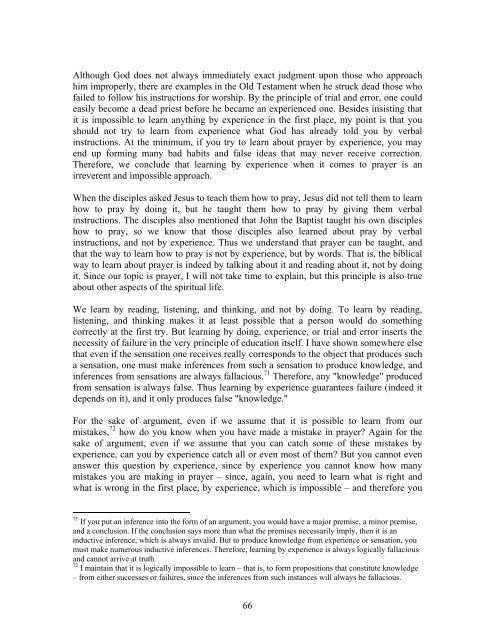Prayer and Revelation - Online Christian Library
Prayer and Revelation - Online Christian Library
Prayer and Revelation - Online Christian Library
You also want an ePaper? Increase the reach of your titles
YUMPU automatically turns print PDFs into web optimized ePapers that Google loves.
Although God does not always immediately exact judgment upon those who approachhim improperly, there are examples in the Old Testament when he struck dead those whofailed to follow his instructions for worship. By the principle of trial <strong>and</strong> error, one couldeasily become a dead priest before he became an experienced one. Besides insisting thatit is impossible to learn anything by experience in the first place, my point is that youshould not try to learn from experience what God has already told you by verbalinstructions. At the minimum, if you try to learn about prayer by experience, you mayend up forming many bad habits <strong>and</strong> false ideas that may never receive correction.Therefore, we conclude that learning by experience when it comes to prayer is anirreverent <strong>and</strong> impossible approach.When the disciples asked Jesus to teach them how to pray, Jesus did not tell them to learnhow to pray by doing it, but he taught them how to pray by giving them verbalinstructions. The disciples also mentioned that John the Baptist taught his own discipleshow to pray, so we know that those disciples also learned about pray by verbalinstructions, <strong>and</strong> not by experience. Thus we underst<strong>and</strong> that prayer can be taught, <strong>and</strong>that the way to learn how to pray is not by experience, but by words. That is, the biblicalway to learn about prayer is indeed by talking about it <strong>and</strong> reading about it, not by doingit. Since our topic is prayer, I will not take time to explain, but this principle is also trueabout other aspects of the spiritual life.We learn by reading, listening, <strong>and</strong> thinking, <strong>and</strong> not by doing. To learn by reading,listening, <strong>and</strong> thinking makes it at least possible that a person would do somethingcorrectly at the first try. But learning by doing, experience, or trial <strong>and</strong> error inserts thenecessity of failure in the very principle of education itself. I have shown somewhere elsethat even if the sensation one receives really corresponds to the object that produces sucha sensation, one must make inferences from such a sensation to produce knowledge, <strong>and</strong>inferences from sensations are always fallacious. 71 Therefore, any "knowledge" producedfrom sensation is always false. Thus learning by experience guarantees failure (indeed itdepends on it), <strong>and</strong> it only produces false "knowledge."For the sake of argument, even if we assume that it is possible to learn from ourmistakes, 72 how do you know when you have made a mistake in prayer? Again for thesake of argument, even if we assume that you can catch some of these mistakes byexperience, can you by experience catch all or even most of them? But you cannot evenanswer this question by experience, since by experience you cannot know how manymistakes you are making in prayer – since, again, you need to learn what is right <strong>and</strong>what is wrong in the first place, by experience, which is impossible – <strong>and</strong> therefore you71 If you put an inference into the form of an argument, you would have a major premise, a minor premise,<strong>and</strong> a conclusion. If the conclusion says more than what the premises necessarily imply, then it is aninductive inference, which is always invalid. But to produce knowledge from experience or sensation, youmust make numerous inductive inferences. Therefore, learning by experience is always logically fallacious<strong>and</strong> cannot arrive at truth.72 I maintain that it is logically impossible to learn – that is, to form propositions that constitute knowledge– from either successes or failures, since the inferences from such instances will always be fallacious.66
















